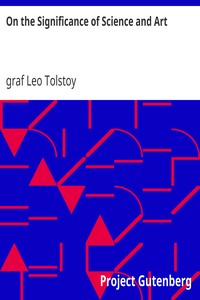On the Significance of Science and Art by graf Leo Tolstoy
"On the Significance of Science and Art" by graf Leo Tolstoy is an intellectual treatise written in the late 19th century. This work scrutinizes the prevailing philosophies of science and art, questioning their true roles in society and their impacts on humanity. Tolstoy critiques the notion that contemporary science and art serve the greater good, suggesting instead that they often justify moral shortcomings and perpetuate inequality, thereby warranting deeper reflection on their
genuine contributions to the human condition. The beginning of the text introduces readers to Tolstoy's inquiries into the justification behind the idleness of certain classes in society, which he argues has been rationalized through the adoption of flawed scientific doctrines. He delves into philosophical concepts, particularly criticizing the Hegelian principles and Malthusian theories that have justified social inequalities and class divisions. Tolstoy frames the discussion around the idea that all humans, like cells in an organism, have purposes within society that should ideally support one another. His argument points to a growing disconnection between intellectual pursuits and their relevance to the wellbeing of the common people, urging a reassessment of how science and art should serve humanity at large. (This is an automatically generated summary.)
Read or download for free
| Reading Options | Url | Size | |||
|---|---|---|---|---|---|
| Read now! | https://www.gutenberg.org/ebooks/3631.html.images | 163 kB | |||
| EPUB3 (E-readers incl. Send-to-Kindle) | https://www.gutenberg.org/ebooks/3631.epub3.images | 134 kB | |||
| EPUB (older E-readers) | https://www.gutenberg.org/ebooks/3631.epub.images | 134 kB | |||
| EPUB (no images, older E-readers) | https://www.gutenberg.org/ebooks/3631.epub.noimages | 114 kB | |||
| Kindle | https://www.gutenberg.org/ebooks/3631.kf8.images | 287 kB | |||
| older Kindles | https://www.gutenberg.org/ebooks/3631.kindle.images | 277 kB | |||
| Plain Text UTF-8 | https://www.gutenberg.org/ebooks/3631.txt.utf-8 | 154 kB | |||
| Download HTML (zip) | https://www.gutenberg.org/cache/epub/3631/pg3631-h.zip | 134 kB | |||
| There may be more files related to this item. | |||||
Similar Books
About this eBook
| Author | Tolstoy, Leo, graf, 1828-1910 |
|---|---|
| Translator | Hapgood, Isabel Florence, 1850-1928 |
| Title | On the Significance of Science and Art |
| Credits | Transcribed from the 1887 Tomas Y. Crowell "What to do?" edition by David Price |
| Reading Level | Reading ease score: 55.0 (10th to 12th grade). Somewhat difficult to read. |
| Language | English |
| LoC Class | PG: Language and Literatures: Slavic (including Russian), Languages and Literature |
| Subject | Philosophy |
| Subject | Literature |
| Subject | Art and science |
| Subject | Tolstoy, Leo, graf, 1828-1910 -- Philosophy |
| Category | Text |
| EBook-No. | 3631 |
| Release Date | Jan 1, 2003 |
| Most Recently Updated | Dec 27, 2007 |
| Copyright Status | Public domain in the USA. |
| Downloads | 438 downloads in the last 30 days. |
| Project Gutenberg eBooks are always free! | |

